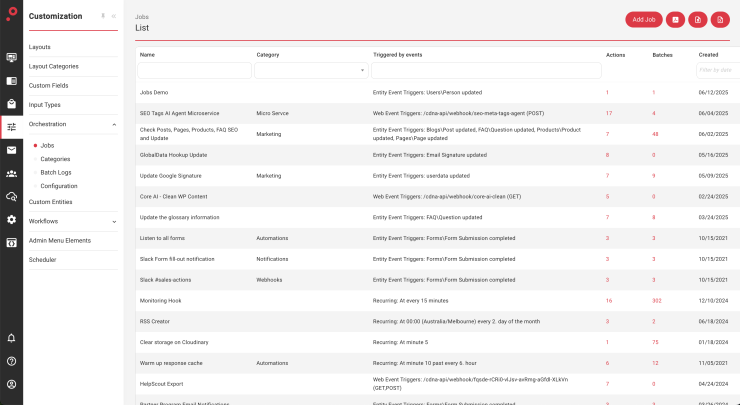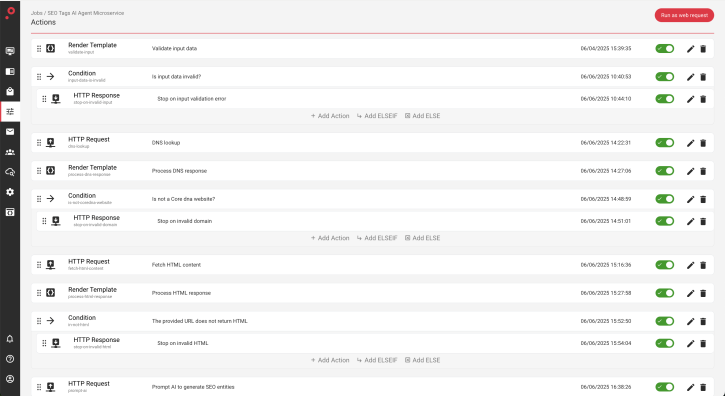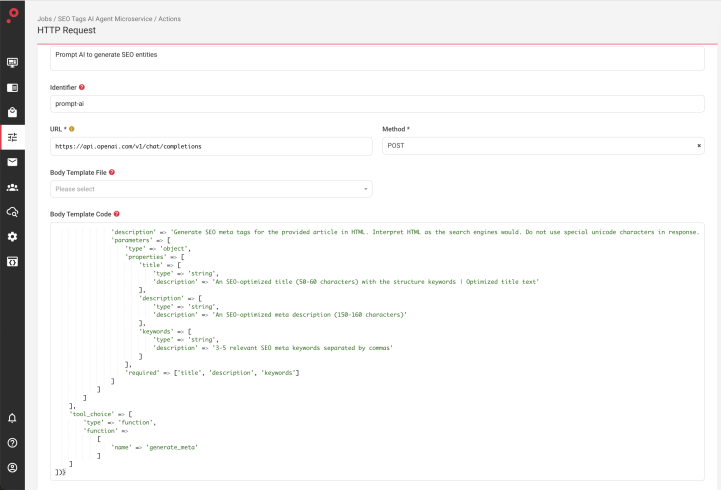How to build AI Agents with Core dna's Orchestration Module

Summarize with
Core dna has always been known as a robust CMS and eCommerce platform, but today, we are pushing the limits of what is possible with a full-fledged orchestration platform.
By combining content management, commerce, and automation in a unified environment, Core dna empowers teams to build sophisticated, AI-powered workflows without relying on third-party plugins or custom development. The orchestration module is the engine behind this transformation.
In this article, we'll explore how Core dna's orchestration module evolved, how it supports powerful automations and how it now enables AI-powered microservices.
Whether you're a business or a digital agency, understanding this evolution reveals a new frontier of low-code digital experience management.
Key takeaways
- Core dna’s orchestration module turns your CMS into a digital operations platform.
- Businesses can build their own AI agents and microservices, directly inside Core dna, no external tools or plugins needed.
- Unlike plugin-heavy systems, Core dna delivers a secure, scalable, and compliant ecosystem, built for mid-sized businesses that want flexibility without sacrificing control.
On this page:
What is the Core dna Orchestration Module?
At the heart of Core dna’s intelligent automation capabilities lies the orchestration module.
It is a low-code, visual workflow engine that allows organizations to design and execute business logic across their content and commerce infrastructure.
Unlike external automation tools, Core dna’s orchestration module is natively integrated into the platform, meaning it understands your content types, user roles, product structures, and localization rules out of the box. This tight integration enables orchestrations to act directly on your business logic with precision and speed.
Core dna's orchestration module enables you to:
- Define trigger-based workflows using system events like content updates, form submissions, user registrations, product stock changes, and more
- Build both simple automations and complex, multi-step processes using a visual builder
- Interact with external APIs and AI agents in real time using HTTP requests, webhook responses, and function schemas
- Validate input conditions before executing actions, avoiding unwanted or premature automation
- Handle branching logic and conditional workflows using a built-in decision framework
- Track every execution through detailed batch logs, with input/output inspection for every step in a Job
- Group and categorize workflows to align with business units or goals (e.g., SEO, CRM, product operations)

Each automation workflow in the orchestration module is encapsulated in a Job, a modular unit that contains the logic, steps, triggers, and outputs of your automation. Jobs can be configured to run in real time (synchronous) or in the background (asynchronous), depending on the use case. This module transforms Core dna from a CMS into a full digital operations platform. With it, you can:
- Automate repetitive backend tasks
- Connect disparate parts of your digital stack
- Build reusable services that act like internal APIs
- Scale personalization, SEO, and translation without added headcount or plugins
Whether you’re building a customer onboarding experience, aself-service B2B portal, or a multilingual content workflow, Core dna’s orchestration module makes it possible with less code and more speed.
Building AI Agents and AI Apps : The Next Layer of Intelligence
The real leap in Core dna's orchestration capability comes with the ability to build and deploy AI agents. These agents are essentially microservices created using synchronous Jobs that integrate with large language models such as OpenAI.
They allow customers to bring real time intelligence into their content workflows without building external systems.
To build an AI agent in Core dna, we use our orchestration module and accept live input, calls an AI service to generate a response, and then returns structured data for use inside the platform.
These AI agents can be used for a variety of purposes such as content summarization, SEO enhancement, translation, data extraction, or personalization.


Example: The SEO AI Agent
An example of an AI agent is the SEO Meta Tag Agent. It helps automatically generate SEO fields for pages, blog posts, product descriptions, and more. This is how it works:
- It is triggered when a piece of content is updated such as a blog post or product
- It checks if the content is published and whether SEO fields like title and description are missing
- If conditions are met, the system sends a request to a synchronous Job, the AI agent, with the page URL
- The Job fetches the HTML content of that URL and parses the data
- It calls OpenAI with a structured prompt using function calling to specify what fields to return
- The response is returned as a clean JSON object containing SEO title, description, and keyword suggestions
This AI agent acts like a native microservice and is accessible through a secure public endpoint. Core dna validates that the URL belongs to an authorized site by using DNS verification or custom logic. That ensures the AI agent is only used by customers within the Core dna ecosystem.
AI agents are designed to be reusable, customizable, and secure. They eliminate the need for every customer to manually configure or interact with third party AI tools. Instead, the intelligence is baked directly into the platform and can be accessed via a simple orchestration Job.
As more of these agents are created, they will be bundled as AI Apps, making them visible and actionable within the platform’s admin panel.
That is how customers move from manual processes to automated intelligence, and from siloed tools to scalable AI apps built with Core dna.
Why we Build, Not Bolt On
At Core dna, we believe intelligent automation should be part of your platform’s DNA, not something you bolt on through risky plugins or fragile integrations. Platforms that rely heavily on third-party plugins often struggle with inconsistent quality, poor maintenance, version conflicts, and serious security concerns.
As plugin ecosystems grow, so do the problems:
- Harder to find vetted, reliable plugins
- Difficult to maintain compliance across dependencies
- No unified way to track or audit what's running across environments
- Increased performance and security vulnerabilities
This is why Core dna takes a different approach. Instead of relying on external modules, we give our customers the power to build their own AI agents and microservices directly within a secure, governed orchestration environment.
Whether you want to generate SEO fields, translate content, connect to CRMs, or build custom AI apps for your clients, you can do it natively.
You are not limited to what exists in a plugin marketplace, you can create what your business needs and control how it scales, evolves, and integrates with the rest of your digital stack.
That is what makes Core dna more than a CMS or eCommerce platform. It is an intelligent, composable system where every automation is secure, traceable, and purpose-built.
Real World Applications: CMS, eCommerce, and LMS
The orchestration module is not just theoretical. It is actively powering real solutions across Core dna implementations today. Here are some key areas where AI apps and orchestrated workflows are already delivering results:
Content Management Systems
Teams use Core dna CMS to streamline publishing and improve content performance using embedded AI. A few examples of AI agents functionalities are:
- Automatically generate SEO fields including meta titles, descriptions, and keywords
- Suggest headlines and summaries for blog content
- Trigger real time translations for multilingual publishing
- Summarize long form articles for previews and search engine snippets
eCommerce Operations
Orchestration supports intelligent eCommerce workflows that increase efficiency and personalization:
- Automatically generate alt text for product images to meet accessibility and SEO goals
- Enrich product pages with AI written copy based on features and specifications
- Flag low stock or miscategorized items and alert the right teams through integrated notifications
- Integrate with CRM or ERP systems to sync product updates and promotional logic
Learning Management Systems
Core dna's orchestration module allows organizations to build fully functional LMS applications using Custom Entities and AI agents:
- Model courses, modules, and lessons as structured entities
- Assign quizzes from shared question banks automatically
- Run Jobs that control enrollment logic, access expiry, and automated scoring
- Leverage future AI agents to translate course material into different languages
What makes these use cases powerful is that they are not powered by external plugins or bolt-on solutions.
Everything is native to the Core dna platform. Each AI app or intelligent automation is built using the same orchestration logic, connecting content, commerce, and user behavior in one seamless environment.
Whether you are launching a new content site, building a training portal, or managing a product catalog across regions, Core dna gives you the building blocks to create intelligent experiences at scale.
Why Building AI Agents and Microservices matters
Core dna orchestration module empowers customers and their partners to build and scale their own intelligent tools with ease. These capabilities turn the platform into a development environment for AI apps that can be packaged, reused, and even monetized.
With Core dna, customers and partners can create custom internal tools that automate content, product, or training operations, build branded microservices for clients without needing to write backend infrastructure and even offer white labeled AI solutions like metadata generators, content summarizers, or language translators
For example, an SEO agency could build a fully functional AI app within Core dna to generate metadata, titles, and content briefs. This could then be deployed to their clients as a native experience, all without needing to host or secure a separate service.
Similarly, a multi brand retailer could use one Core dna platform to manage dozens of orchestrated workflows across business units.
Whether you are selling your services to clients or managing automation across brands, Core dna gives you the power to build smart, scalable, and secure AI apps on your terms.
A Smarter and More Secure Path to Digital Innovation
In a time when the open-source community is wrestling with plugin trust, accessibility issues, and governance challenges, Core dna offers a fundamentally different approach.
Marketers and digital teams don't have to risk the business security by trusting 25 plugins vendors to achieve basic functionalities. Instead of stitching together third-party tools, customers can build the exact microservices they need using secure, native capabilities in Core dna.
Every Job, every App, and every AI agent is part of a single, governed ecosystem.
This matters now more than ever. With new regulations like GDPR, CRA, and evolving accessibility standards, businesses can no longer afford to rely on poorly maintained plugins or opaque distribution systems.
The Fair project and Linux Foundation’s involvement in open-source CMS reform underscore just how urgent these problems have become.
Core dna removes the uncertainty. You get a centralized system where workflows are traceable, AI agents are auditable, and every automation respects your compliance and security requirements.
No plugin roulette. No vendor lock-in. Just intelligent experiences built from the ground up.
As AI reshapes how we work, platforms must evolve too. Core dna’s orchestration module ensures you are not just reacting to change, but leading it by building AI apps and microservices that are secure, scalable, and entirely your own.





